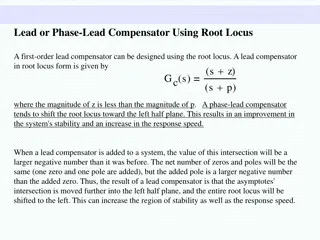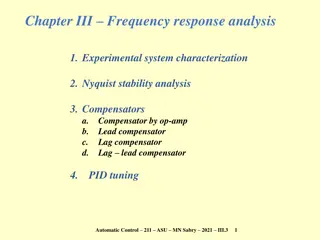Understanding Lead and Phase-Lead Compensators
Lead and Phase-Lead compensators play a crucial role in improving system stability and response speed. By using the root locus and frequency response methods, these compensators shift the root locus toward the left half-plane, adding positive phase over the frequency range. This leads to increased s
0 views • 16 slides
Understanding PID Controllers in Control Systems
PID controllers, utilized in various industries, provide control feedback compensation through proportional, integral, and derivative components to modulate error and achieve desired system response. Different compensators like PI, PD, and PID offer varying characteristics impacting stability, overs
0 views • 11 slides
Understanding Power Quality Issues in Smart Grids
Power quality issues in smart grids are important considerations due to the impact of modern electronic devices and renewable energy sources. This article discusses the causes, effects, and solutions related to voltage fluctuations, sags, swells, and unbalance in three-phase systems. Various mitigat
0 views • 9 slides
Lead Compensator Design for Improved Transient Response in Automatic Control Systems
Lead compensators are utilized in automatic control systems to enhance transient response. By designing a lead compensator, one can adjust stability and error parameters for optimal system performance. This involves determining the appropriate gain and phase margin to meet error constraints and achi
0 views • 12 slides



